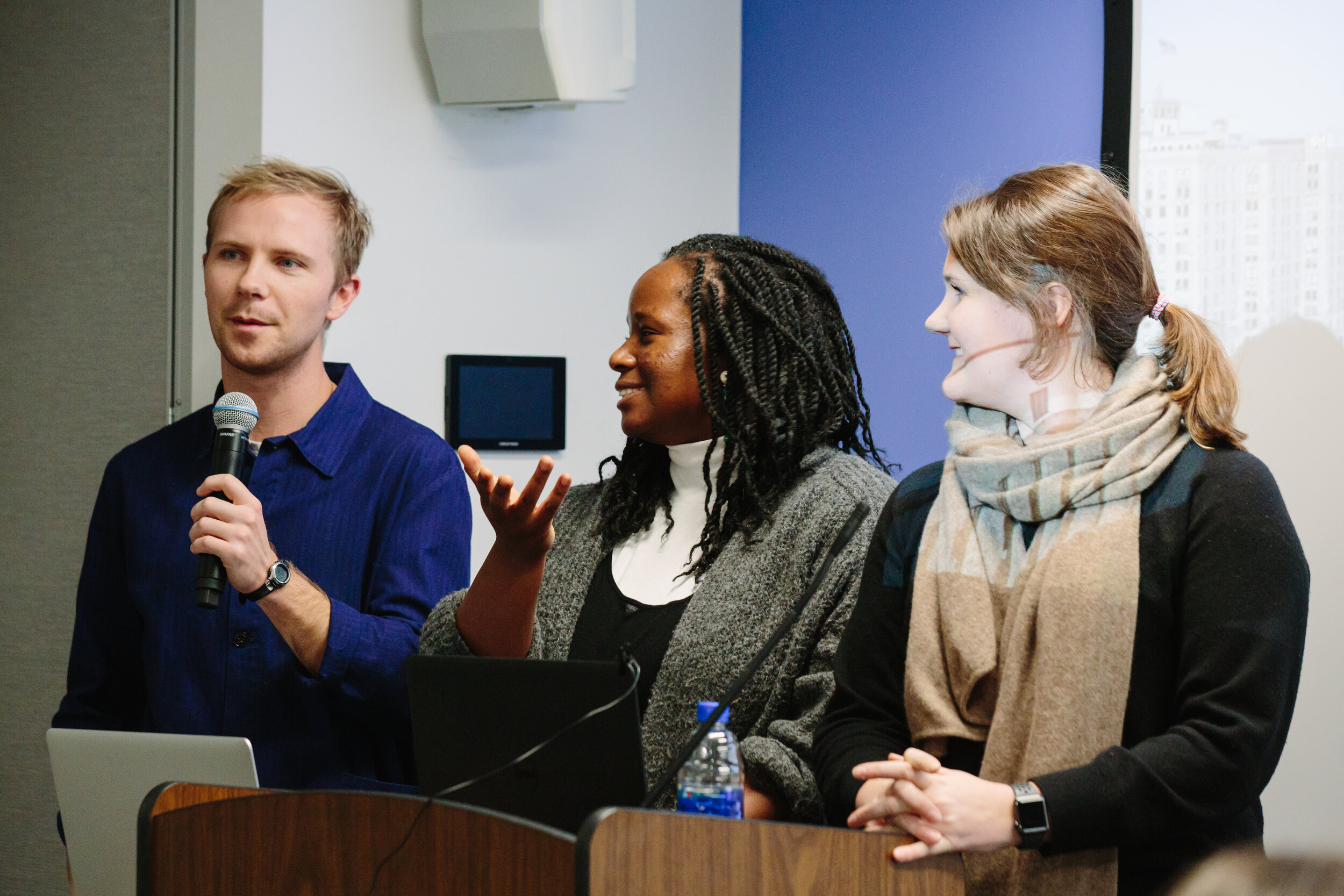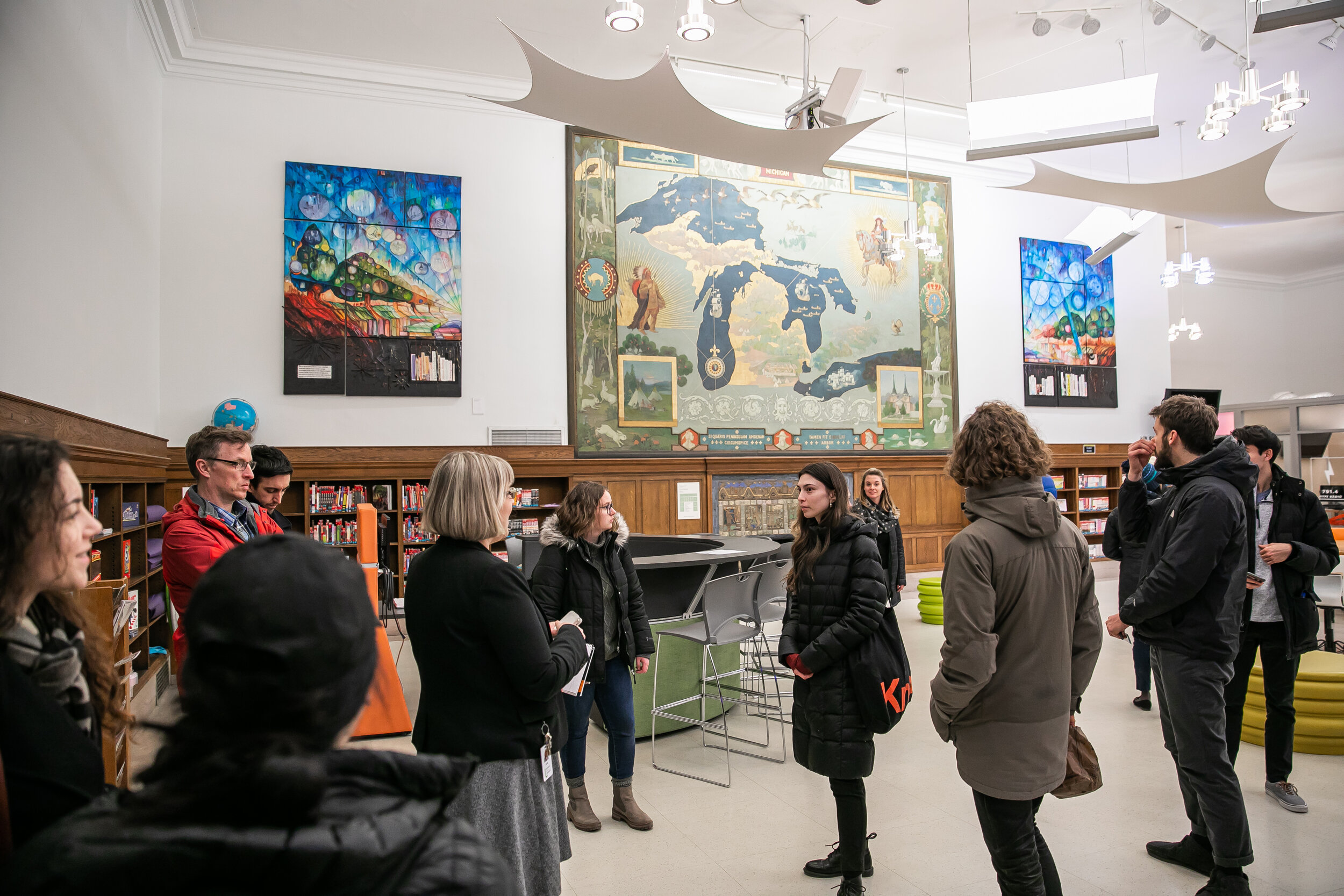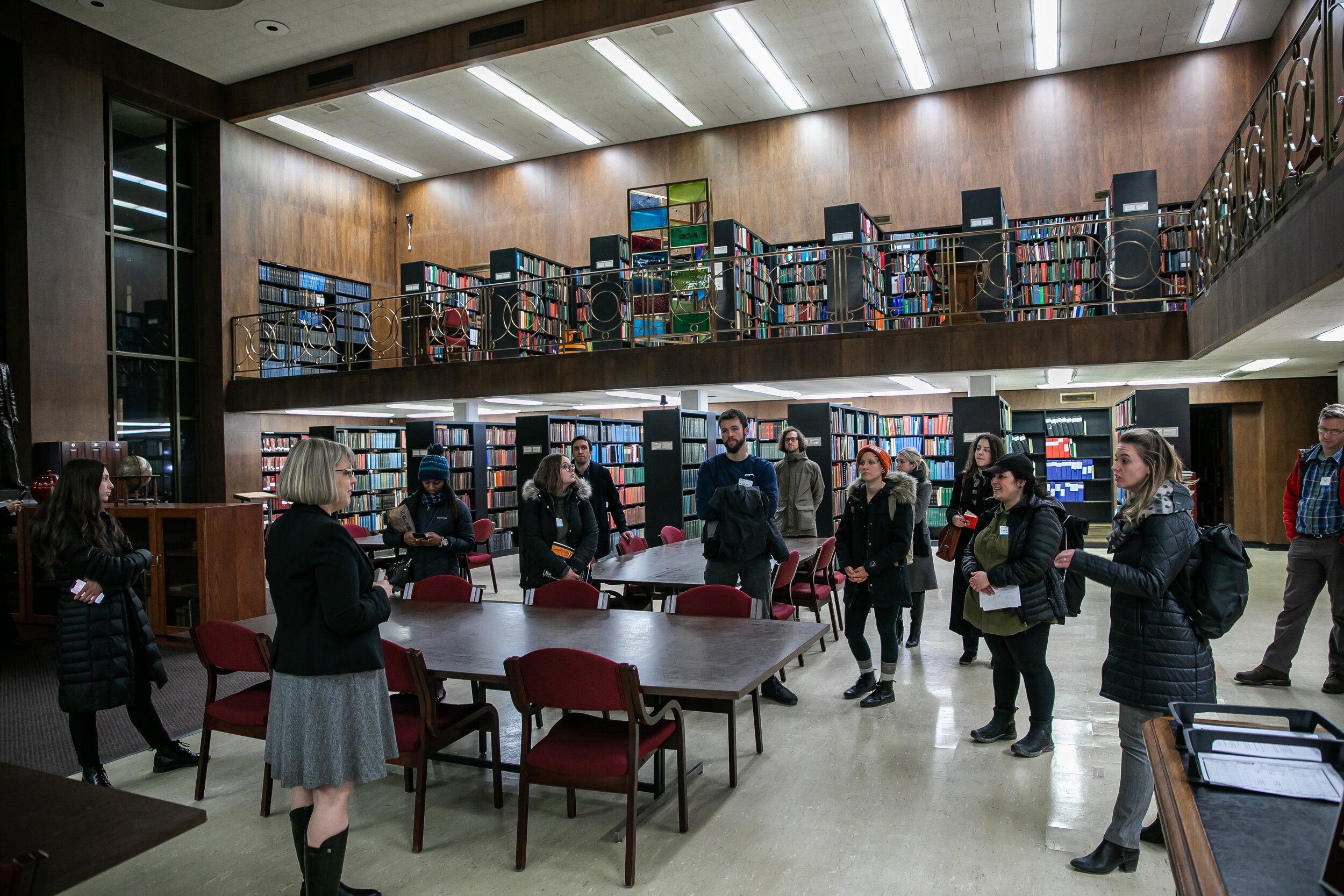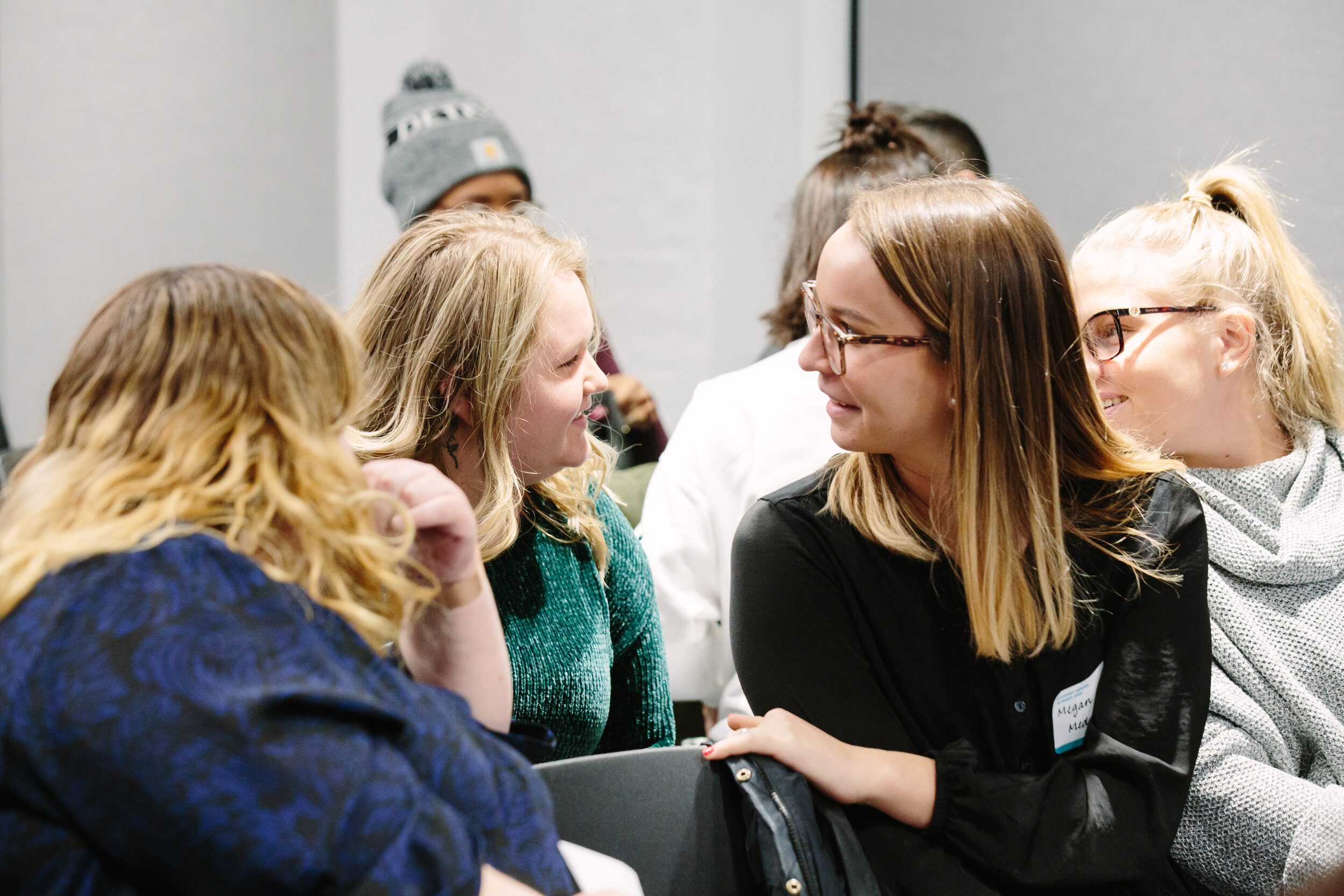The Student Design SummiT
The Student Design Summit is a complementary component of the Cultural Center Planning Initiative (CCPI) meant to engage students in contemporary design practice and community involvement. The Winter 2022 Design Summit will be a two-day Design Jam with a virtual introduction from 5-7 pm on Friday, February 4 and an in-person workshop at the College for Creative Studies from 9 am – 4 pm on Saturday, February 5 to provide a space for facilitated conversation, interaction and fun. Open to high school and university students in the State of Michigan, the Design Summit will provide an opportunity for students to work in teams to explore the concept of what it means for a place to be welcoming and inclusive, while conceptualizing a future welcome center for Detroit’s Cultural Center.
Students from many different disciplines are encouraged to apply, including all art and design fields, architecture, urban planning, sustainability, business, marketing, and public policy.
In addition to a share in the prize money for the winning teams, students will benefit from the learning experience, interaction with peers from other schools and colleges, and the opportunity to develop work that may be included in a portfolio, resume, or application.
Faculty are encouraged to participate themselves as facilitators and to encourage student participation. The competition topic is relevant and timely for exploration across many different disciplines as organizations look for tangible ways to adopt more inclusive practices.
4th Student Design Summit
Images courtesy of Agence Ter-Akoaki, LLC
Design Jam: A Welcome Center for Detroit’s Cultural District
Important Dates:
January 17, 2022, 12:00 am – Application Deadline
February 4, 2022, 5:00 – 7:00 pm – Virtual Design Jam on Zoom
February 5, 2022, 9:00 am – 4:00 pm – In-person Design Jam at College for Creative Studies
Design Jam Format
Up to 60 attendees will be assigned to six multidisciplinary teams of 8-10 attendees will be selected to participate in this two-part, hands-on design challenge.
The first day of the Design Jam starts with a virtual presentation and discussion to accelerate concepts on what it means to design welcoming and inclusive public spaces.
The second day will be in-person at College for Creative Studies at the A. Alfred Taubman Center for Design Education in Detroit. Students will break out into their assigned teams and move through a facilitated design thinking sprint to develop concepts for a Welcome Center in Detroit’s Cultural Center. The teams will use their multidisciplinary knowledge to ideate, narrow, and prototype their ideas before presenting to the group at the end of the day.
Ideas could include programming concepts, physical designs, visual communication frameworks, new products or services or more. These ideas could be expressed through physical prototypes, images, animations or video as time permits.
Design Challenge
CCPI invites students to reinvent the concept of a Welcome Center for the Cultural Center in order for this district to lead the way in what it means for a place to welcome visitors of diverse backgrounds in the 21st century. Visions should be designed to promote the excellence, inclusiveness and cultural vibrancy our individual institutions are recognized for.
Welcome centers, also known as visitors’ centers, visitor and/or tourist information centers, are buildings normally located at either entrances to states or major ports of entry, such as interstates or major highways, or in strategic cities within regions of a state. The nation’s first Highway Travel Information center opened on May 4, 1935, on US-12 in New Buffalo, MI and was built by the Michigan State Highway Department, now the Michigan Department of Transportation, to welcome motorists entering the state via US-12. Welcome centers or visitor centers often serve as rest areas for motorists, provide information or free brochures relating to nearby attractions, lodging and dining for tourists to improve their stay and can serve as a showcase for the state or city. They often aim to convince visitors to stay a little longer.
The CCPI has proposed to place a ‘Welcome Center’ on the existing DIA-owned John R surface parking lot. It was originally conceived to serve as an orientation center for students before they visited their prospective cultural institution, providing space for them to eat lunch or participate in other cultural activities before loading back on their bus to return home. It was also a building that was designed to serve as a flex space for the district, to accommodate larger events and beyond. No program, budget, or architectural design and scale have been established for this building, nor has a larger vision for how this space could be used to welcome visitors to the Cultural Center.
What does it mean to be welcomed? How might we develop inviting and inclusive public space that accommodates all types of uses and makes residents and visitors feel safe, respected and comfortable in being themselves and expressing all aspects of their identities?
How might we tell the story of Detroit’s Cultural Center as a district while respecting and honoring all of the institutions as individual entities? How might this Welcome Center embody the brand for the Cultural Center?
How might we design this public space? What might it look and feel like? What types of experiences might it accommodate?
How might digital technology help us to share information about the Cultural Center and engage new people?
How might we incorporate sustainability principles in how this space is designed, funded and managed?
Winter 2022 Design Jam Partners:
CCPI History
Before it was the Cultural Center Planning Initiative (CCPI), the initiative was the DIA Plaza | Midtown Cultural Connections international design competition, which began with the idea that animated public spaces have the power to bring people together and make a community stronger. The effort to realize a public space that enforced democracy, harmony and connections among the cultural institutions and residents as well as for visitors, started with a grant awarded to the Detroit Institute of Arts (DIA) for a plaza, and, with an understanding that the area holds potential for so much more, transformed into a broader district revitalization. The DIA partnered with Midtown Detroit, Inc. (MDI), a nonprofit community and economic development organization that represents the Midtown and New Center districts, to implement a design competition.
The DIA Plaza | Midtown Cultural Connections competition centered around enhancing and enlivening the DIA’s exterior campus. It sought an outstanding integrated design team for developing an urban and landscape design strategy and connection framework. On August 22, 2018, the DIA and MDI announced the winning design team consisting of Agence Ter-Akoaki LLC, an international collaborative of designers led jointly by Paris, France-based Agence Ter and Detroit-based Akoaki. Their project, Detroit Square, highlights the importance of shared cultural infrastructure for Detroit’s Cultural Center. rootoftwo is leading the masterplan for the creative/civic technology aspects of the initiative as part of the larger design team. A distinguished jury of national and local practitioners selected the design team in 2018 through an international competition that attracted 44 submissions from 10 countries and 22 cities.
By December 2021 the design team will complete the conceptual design for Detroit Square – the culmination of CCPI’s initial 2+ years planning phase. CCPI is guided by a steering committee comprised of cultural district leaders, and project management support is provided by Midtown Detroit, Inc. Institutions participating in this initiative include:
The Carr Center
Charles H. Wright Museum of African American History
College for Creative Studies
Detroit Historical Museum
Detroit Institute of Arts
Detroit Public Library
Hellenic Museum of Michigan
International Institute of Metro Detroit
Michigan Science Center
The Scarab Club
University of Michigan
Wayne State University











